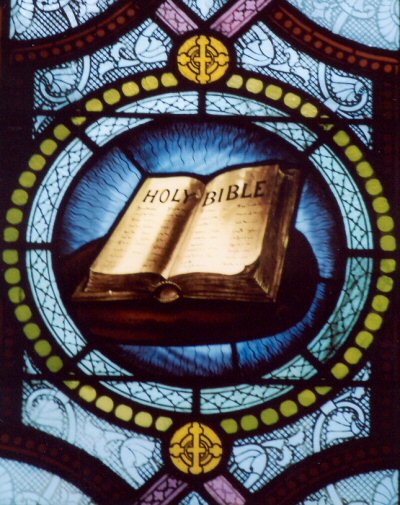 Liturgy of the Word
Liturgy of the WordSolemnity of the Body and
Blood of Christ
June 22, 2014, Cycle A
White priestly vestments symbolize purity and integrity of the
life of faith.
Home Page
Liturgical
Year Cycle A 13-14
Introductory Acts Of Worship
The Entrance Prayers:
On Sunday, usually a hymn praising God
is sung in place of reciting a Psalm from the Bible which invites us to
enter more deeply into the mystery of God's love for us. The recited
weekday Psalm expresses a youthful heart and spirit, delighted that we may come
before the living God.
Entrance Song
/ Entrance Psalm (Antiphon)
Entrance Song
Psalm 81
He fed them with finest wheat and satisfied
them with honey from the rock.
The Priest Approaches and Kisses the Altar: The altar is a symbol of Christ. In it are cut five crosses to recall the five wounds of Christ. The altar also represents the Church and has embedded in it the relics of her saints. The priest comes to the altar to celebrate the Sacrifice in the Church's name. Because of the glory surrounding the altar upon which the divine Sacrifice will be made, the kiss of the priest unites the Church to Christ, its Redeemer.
Priest:
In the name of the Father, and of the Son, and of the Holy Spirit.
All:
Amen.
The Greeting: We are welcomed in God's name. Our response unites us to our neighbor, to the priest and to God. (The priest may select from several forms of greeting).
Priest: The Lord
be with you.
All:
And with your spirit.
The Penitential Prayers:
We recognize our guilt for past sins,
express our sorrow for them, and ask that Mary, the angels, the saints, and our
brothers and sisters in Christ pray for the Lord God's mercy. (The priest
may select from several forms).
Priest: Brothers and sisters, let
us acknowledge our sins, and so prepare ourselves to celebrate the sacred
mysteries. Have mercy on us, O Lord.
All: For we have sinned against you.
Priest: Show us, O Lord, your mercy.
All: And grant us your salvation.
The Absolution:
Priest: May almighty God have
mercy on us, forgive us our sins, and bring us to everlasting life.
All: Amen.
The Gloria: The Glory of God prayers have existed from the second century. They repeat the angels praise of God which heralded the birth of Christ on earth. Our praise is lifted again through the years as we rejoice at His coming as Lord, God, the most high Jesus Christ, who at Christmas took on our human nature while at the same time being the son of Man. This ancient hymn expresses our recognition of God's glory and love. It calls upon Christ as our holy and divine mediator, and the Holy Spirit who forever binds us together in God's love.
Priest and All: Glory to God in the highest, and peace to his people on earth. Lord God, heavenly King, almighty God and Father, we worship you, we give you thinks, we praise you for your glory. Lord Jesus Christ, only son of the Father, Lord God, Lamb of God, you take away the sins of the world: have mercy on us; you are seated at the right hand of the Father: receive our prayer. For you alone are the Holy One, you alone are the Lord, you alone are the Most High, Jesus Christ, with the Holy Spirit, in the glory of God the Father. Amen.
The Collect: The priest lifts the united prayers and petitions of the congregation to God the Father through the merits of Jesus Christ in the Holy Spirit.
Priest: O God, who in this wonderful Sacrament have left us a
memorial of your Passion, grant us, we pray, so to revere the sacred mysteries
of your Body and Blood that we may always experience in ourselves the fruits of
your redemption. Who live and reign with God the Father in the unity of
the Holy Spirit, one God, for ever and ever.
 Liturgy of the Word
Liturgy of the Word
Christ is made known to us through the
Old Testament which prepares us to recognize Him. In those days, God
inspired men who spoke His message. Now, the New Testament Gospel reading
announces His presence to us directly through His Son. Both
readings bring God's message to us. Our responsibility is to respond.
The First Reading:
From the Old Testament
Priest/Reader: A reading from the
book of Deuteronomy.
First Reading: Deuteronomy 8:2-3, 14b-16a
Moses said to the people: “Remember how for forty years now the Lord, your God, has directed all your journeying in the desert, so as to test you by affliction and find out whether or not it was your intention to keep his commandments. He therefore let you be afflicted with hunger, and then fed you with manna, a food unknown to you and your fathers, in order to show you that not by bread alone does one live, but by every word that comes froth from the mouth of the Lord.
The Responsorial Psalm:
This Psalm praising God, is a prayer to God,
or recommends the practice of virtue. It is sung as an interlude between
the scriptural readings. It provides yet another instructional setting and
invites the assembly to imitate the cantor who sings a repeated response to the
verses of an ancient Psalm many of which are attributed to King David. The
verses are sung first by a cantor (song leader) accompanied by instruments, the
refrain is sung by the people.
Psalm 147:12-13, 14-15, 19-20
Cantor: Praise the Lord, Jerusalem.
All:
Praise the Lord, Jerusalem.
Cantor: Glorify the Lord, O Jerusalem; praise your God, O Zion.
For he has strengthened the bars of your gates; he has blessed your children
within you.
All:
Praise the Lord, Jerusalem.
Cantor: He has granted peace in your borders; with the best of wheat
he fills you. He sends forth his command to the earth; swiftly runs his word!
All:
Praise the Lord, Jerusalem.
Cantor: He has proclaimed his word to Jacob, his statutes and his
ordinances to Israel. He has not done thus for any other nation; his ordinances
he has not made known to them. Alleluia.
All:
Praise the Lord, Jerusalem.
The Second Reading:
Taken from the New Testament, often from a
letter written by St. Paul.
Second Reading: 1 Corinthians 10:16-17
Brothers and sisters: The cup of blessing what we bless, is it not a
participation in the blood of Christ? The bread that we break, is it not a
participation in the body of Christ? Because the loaf of bread is one, we,
though many, are one body, for we all partake of the one loaf.
The Sequence: "Lauda Sion." A hymn of joy said or sung before the Gospel on certain feast days.
Cantor: Laud, O Zion, your salvation, Laud with hymns of exultation, Christ, your king and shepherd true: bring him all the praise you know, He is more than you bestow. Never can you reach his due. Special theme for glad thanksgiving is the quick'ning and the living bread today before you set: from his hands of old partaken, as we know, by faith unshaken, where the Twelve at supper met. Full and clear ring out your chanting, joy nor sweetest grace be wanting, from your heart let praises burst: for today the feast is holden, when the institution olden of that supper was rehearsed. Here the new law’s new oblation, by the new king’s revelation, ends the form of ancient rite: now the new the old effaces, truth away the shadow chases, light dispels the gloom of night.
What he did at supper seated, Christ ordained to be repeated, His memorial ne’er to cease: and his rule for guidance taking, bread and wine we hallow, making thus our sacrifice of peace. This the truth each Christian learns, bread into his flesh he turns, to his precious blood the wine: sight has failed, nor thought conceives, but a dauntless faith believes, resting on a pow’r divine. Here beneath these signs are hidden priceless things to sense forbidden; sign, not things are all we see: blood is poured and flesh is broken, yet in either wondrous token Christ entire we know to be. Whoso of this food partakes, does not rend the Lord nor breaks; Christ is whole to all that tastes: thousands are, as one, receivers, one, as thousands of believers, eats of him who cannot waste.
Bad and good the feast are sharing, of what divers dooms preparing, endless death, or endless life. Life to these, to those damnation, see how like participation is with unlike issues rife. When the sacrament is broken, doubt not, but believe ‘tis spoken, that each sever’d outward token doth the very whole contain. Nought the precious gift divides, breaking but the sign betides Jesus still the same abides, still unbroken does remain. Lo! The angel’s food is given to the pilgrim who has striven; see the children’s bread from heaven, which on dogs may not be spent. Truth the ancient types fulfilling, Isaac bound, a victim willing, Paschal limb, its lifeblood spilling, Manna to the fathers sent. Very bread, good shepherd, tend us, Jesu, of your love befriend us, you refresh us, you defend us, your eternal goodness send us in the land of life to see. You who all things can and know, who on earth such food bestow, grant us with your saints, though lowest, where the heav’nly feast you show, fellow heirs and guests to be. Amen. Alleluia.
The Alleluia: An ancient expression of joy anticipating the Lord's message we will hear in the Gospel.
John 6:51-52
Cantor: Alleluia!
Alleluia! Alleluia!
All:
Alleluia! Alleluia! Alleluia!
Cantor: I am the living bread that came down from heaven, says the
Lord; whoever eats this bread will live forever.
All:
Alleluia! Alleluia! Alleluia!
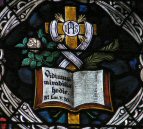 The Gospel:
The Liturgy of the Word is completed
by the reading of the Gospel. Before its reading, the members of the
assembly trace the sign of the cross upon the forehead to indicate their mental
acceptance of the Truth, on the lips to indicate their readiness to announce it,
and over the heart to indicate their sincere desire to accept it into their
lives. The "Good News" of the Gospel tells that God's kingdom has come for
all to hear, accept, and announce to the world for its salvation. It
is God who is speaking to us. Christ comes to teach us by the example of
His life and by His own words.
The Gospel:
The Liturgy of the Word is completed
by the reading of the Gospel. Before its reading, the members of the
assembly trace the sign of the cross upon the forehead to indicate their mental
acceptance of the Truth, on the lips to indicate their readiness to announce it,
and over the heart to indicate their sincere desire to accept it into their
lives. The "Good News" of the Gospel tells that God's kingdom has come for
all to hear, accept, and announce to the world for its salvation. It
is God who is speaking to us. Christ comes to teach us by the example of
His life and by His own words.
Priest: Cleanse my heart and my lips, almighty God, that I may worthily proclaim your
holy Gospel. Through the words of the Gospel may our sins be wiped away.
Priest: The Lord be with you.
All: And
also with you.
Priest/Deacon: A
reading from the holy Gospel according
to John.
All: Glory
to you, Lord.
The Gospel: John 6:51-58
John wrote to show that Christ was
the Messiah, the Divine Son of God.
 Jesus
said to the Jewish crowds: “I am the living bread that came down from heaven;
whoever eats this bread will live forever; and the bread that I will give is my
flesh for the life of the world.”
Jesus
said to the Jewish crowds: “I am the living bread that came down from heaven;
whoever eats this bread will live forever; and the bread that I will give is my
flesh for the life of the world.”
The Jews quarreled among
themselves, saying, “How can this man give us his flesh to eat?” Jesus said to
them, “Amen, amen, I say to you, unless you eat the flesh of the Son of Man and
drink his blood, you do not have life within you. Whoever eats my flesh and
drinks my blood has eternal life, and I will raise him on the last day. For my
flesh is true food, and my blood is true drink. Whoever eats my flesh and
drinks my blood remains in me and I in him. Just as the living Father sent me
and I have life because of the Father, so also the one who feeds on me will have
life because of me. This is the bread that came down from heaven. Unlike your
ancestors who ate and still died, whoever eats this bread will live forever.”
Priest/Deacon: The Gospel of the Lord.
All: Praise
to you, Lord Jesus Christ.
The Priest's Sermon: The priest develops, explains, and comments upon the Master's words, so our minds may be enlightened, and our hearts enriched.
(A priestly reflection upon this Gospel)
Profession of Faith: We state in the Nicene Creed the principles of our faith in precise and definite terms.
General Intercessions: We pray for the needs of the pope, civic leaders, our own needs, those of others, the sick, the dying, those who have died, the church, and the world. The response of all to each intercession: Lord, hear our prayer.
All: Lord,
hear our prayer.
The Liturgy of the Eucharist
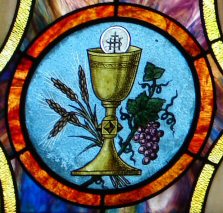 Gifts of bread and wine
symbolizing ourselves are presented to the priest who will offer them to God the
Father. Through the Holy Spirit, they will become the Body and Blood of
Jesus Christ whom we receive in Holy Communion. Jesus unites Himself with
us for our spiritual nourishment and strength. Today, when individuals do
not present their own personal offerings of bread and wine, the monetary contribution
symbolizes the material of their united sacrifice.
Gifts of bread and wine
symbolizing ourselves are presented to the priest who will offer them to God the
Father. Through the Holy Spirit, they will become the Body and Blood of
Jesus Christ whom we receive in Holy Communion. Jesus unites Himself with
us for our spiritual nourishment and strength. Today, when individuals do
not present their own personal offerings of bread and wine, the monetary contribution
symbolizes the material of their united sacrifice.
Preparation of the Bread and Wine:
Priest: Blessed are you, Lord, God of all creation, for through your goodness we have
received the bread we offer you; fruit of the earth and work of human hands, it will become for us the bread of life.
All: Blessed be God for ever.
Priest: By the mystery of this water and wine may we come to
share in the divinity of Christ, who humbled himself to share in our humanity.
Priest: Blessed are you, Lord God of all creation, for through your goodness we have
received the wine we offer you; fruit
of the vine and work of human hands it will become our spiritual drink.
All: Blessed be God for ever.
Priest: Lord God, we ask you to receive us and be pleased with the sacrifice we offer you with humble and contrite hearts.
The Priest's Hands are Washed: This act was traditional necessary because the priest handled the various gifts presented by the people. Now, the cleansing act using water reminds the priest and ourselves of the need to cleanse not only the hands but the soul. Soon, the priest's hands will hold the actual body of Christ, and we will become His dwelling place.
Priest: Lord,
wash away my iniquity; cleanse me from my sin.
Pray, brethren, that
my sacrifice and yours may be acceptable to God, the almighty Father.
All: May the Lord accept the sacrifice at your hands, for the praise and glory of his
name, for our good, and the good of all his holy Church.
Prayer over the Gifts:
Speaking in our name, the priest asks
the Father to accept the gifts we offer through him.
Priest: Grant your Church, O Lord, we pray, the gifts of unity and peace, whose signs are to be seen in mystery in the offerings we here present. Through Christ our Lord.
Eucharistic Prayer: (Number Four: The priest may select from several forms).
Priest: The Lord be with you.
All: And with your
spirit.
Priest: Lift up your hearts.
All: We lift them up to the Lord.
Priest: Let us give thanks to the Lord, our God.
All: It is right
and just.
Preface Prayer:
Priest: It is truly right and just, our duty and our salvation, always and everywhere to give you thanks, Lord, holy Father, almighty and eternal God. For with your Only Begotten Son and the Holy Spirit you are one God, one Lord: not in the unity of a single person, but in a Trinity of one substance.
For what you have revealed to us of your glory we believe equally of your Son and of the Holy Spirit, so that, in the confessing of the true and eternal Godhead, you might be adored in what is proper to each Person, their unity in substance, and their equality in majesty.
For this is praised by Angels and Archangels, Cherubim, too, and Seraphim, who never cease to cry out each day, as with one voice they acclaim:
Acclamation:
Priest / All: Holy, Holy, Holy Lord, God of power and might, Heaven and earth are full of your glory. Hosanna in the highest. Blessed is he who comes in the name of the Lord. Hosanna in the highest.
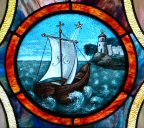
Priest: We give you praise, Father most holy, for you are great and you have fashioned all your works in wisdom and in love. You formed man in your own image and entrusted the whole world to his care, so that in serving you alone, the Creator, he might have dominion over all creatures. And when through disobedience he had lost your friendship, you did not abandon him to the domain of death. For you came in mercy to the aid of all, so that those who seek might find you. Time and again you offered them covenants and through the prophets taught them to look forward to salvation.
And you so loved the world, Father most holy, that in the fullness of time you sent your Only Begotten son to be our Savior. Made incarnate by the Holy Spirit and born of the Virgin Mary, he shared our human nature in all things but sin. To the poor he proclaimed the good news of salvation, to prisoners, freedom, and to the sorrowful of heart, joy. To accomplish your plan, he gave himself up to death, and, rising from the dead, he destroyed death and restored life.
And that we might live no longer for ourselves but for him who died and rose again for us, he sent the Holy Spirit from you, Father, as the first fruits for those who believe, so that, bringing to perfection his work in the world, he might sanctify creation to the full.
Therefore, O Lord, we pray: ma this same Holy Spirit graciously sanctify these offerings, that they may become the Body and Blood of our Lord Jesus Christ for the celebration of this great mystery, which he himself left us as an eternal covenant.
The priest repeats the words which
Christ used at his Last Supper when He changed the bread into His Body and the
wine into His Blood. His Body and Blood are truly present but under the
appearance of bread and wine. The death of Christ is prolonged in each of
those who receive Him worthily. We apply His death to ourselves so that we
may share His glory. This moment is the most solemn on earth because it is
Divine act which enables us to apply to ourselves the Cross which Christ
willingly took upon Himself.
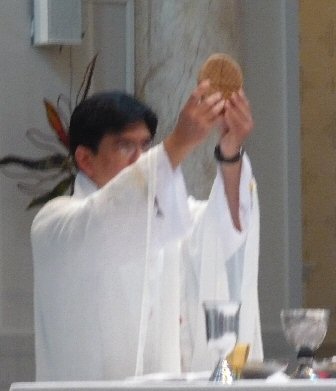 We are called to die to sin and
lift our very selves to God so that we become changed; to do as God would have
us do, to become what God would have us become. Our own little cross can
lift us into union with Christ's Cross so we may earn the joys of everlasting
happiness with God the Father.
We are called to die to sin and
lift our very selves to God so that we become changed; to do as God would have
us do, to become what God would have us become. Our own little cross can
lift us into union with Christ's Cross so we may earn the joys of everlasting
happiness with God the Father.
The Lord's Supper: For when the hour had come for him to be glorified by you, Father most holy, having loved his own who were in the world, he loved them to the end: and while they were at supper, he took bread, blessed and broke it, and gave it to his disciples, saying:
Take this, all of you, and eat of it, for this is my Body, which will be given up for you.
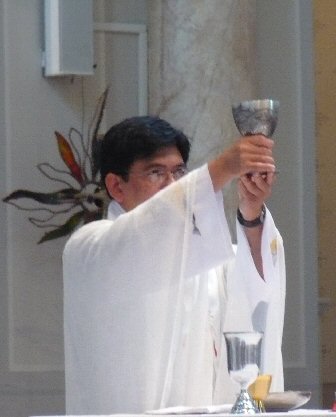 In a similar way taking the chalice filled
with the fruit of the vine, he gave thanks, and gave the chalice to his
disciples, saying:
In a similar way taking the chalice filled
with the fruit of the vine, he gave thanks, and gave the chalice to his
disciples, saying:
Take this, all of you, and drink from it, for this is the chalice of my Blood, the Blood of the new and eternal covenant, which will be poured out for you and for many for the forgiveness of sins. Do this in memory of me.
Memorial Acclamation: (The priest may
select from several forms).
Priest: The
mystery of faith.
Priest
/ All: Save us,
Savior of the world, for by your Cross and Resurrection you have set us free.
Therefore, O Lord, as we now celebrate the memorial of our redemption, we remember Christ's Death and his descent to the realm of the dead, we proclaim his Resurrection and his Ascension to your right hand, and, as we await his coming in glory, we offer you his body and Blood, the sacrifice acceptable to you which brings salvation to the whole world.
Look, O Lord, upon the Sacrifice which you yourself have provided for your Church, and grant in your loving kindness to all who partake of this one Bread and one chalice that, gathered into one body by the Holy Spirit, they may truly become a living sacrifice in Christ to the praise of your glory.
Therefore, Lord, remember now all for whom we offer this sacrifice: especially your servant ____ our Pope, ____ our Bishop, and the whole Order of Bishops, all the clergy, those who take part in this offering, those gathered here before you, your entire people, and all who seek you with a sincere heart. Remember also those who have died in the peace of your Christ and all the dead, whose faith you alone have known.
To all of us, your children, grant, O merciful Father, that we may enter into a heavenly inheritance with the Blessed Virgin Mary, Mother of God, with Blessed Joseph her spouse, and with your Apostles and Saints in your kingdom.
There, with the whole of creation, freed from the corruption of sin and death, may we glorify you through Christ our Lord, through whom you bestow on the world all that is good.
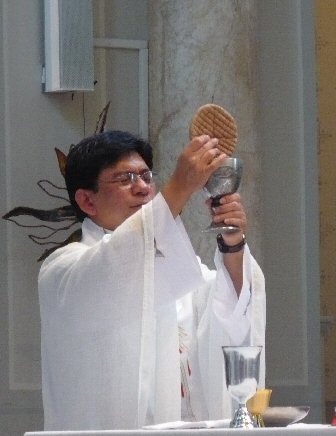 Doxology:
Doxology:
Prayer of Praise:
Through
him, with him, and in him, O God, almighty Father, in the unity of the Holy
Spirit, all glory and honor is yours, for ever and ever.
All: Amen.
Communion Rite
In the Liturgy of the Eucharist, we symbolically offer ourselves to the Lord through the gifts of bread and wine. At the Consecration, we offer our very lives to be united the God the Father through the Cross of Christ. In Communion, we find that we have not died at all, but have come to life. We have surrendered ourselves to God through His Divine Son, Jesus Christ. In return become ennobled and enriched. We give up time and we get eternity, we give up our sin and we receive grace, we surrender our self-will and receive the strength of the Divine Will, we give up ourselves and we receive everything. For the Son of God says to us that unless we receive Him we shall not have Divine life in us. But it is not really we who receive Christ as it is Christ who receives us, bringing us into Himself.
God makes His Cross the very means of our salvation and our life. While we have crucified Him, His eternal love cannot be extinguished. Christ willed to give us the very life we crucified in our Redemption, the Consecration of Holy Thursday into Communion, His death into our everlasting life.
The Lord's Prayer:
Priest: Jesus taught us to call God our Father, and so we have
the courage to say:
Priest and
All: Our
Father, who art in heaven, hallowed be they name; Thy kingdom come; Thy will be
done on earth as it is in
heaven. Give us this
day our daily bread; and forgive us our trespasses as we forgive those who
trespass against us; and lead us not into temptation, but deliver us from evil.
All: For the kingdom, the power and
the glory are yours, now and for ever.
Prayer for Peace:
Priest and All: Lamb of God, you take away the sins of the
world, have mercy on us.
Lamb of God, you take away the sins of the world, have mercy on us.
Lamb
of God, you take away the sins of the world, grant us peace.
Communion of
the Priest:
Priest: May the receiving of your Body
and Blood, Lord Jesus Christ, not bring me to judgment and condemnation, but
through your loving mercy be fore me protection in mind and body and a healing
remedy.
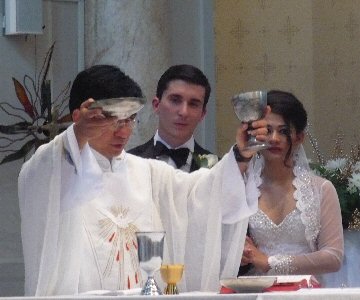 Priestly Preparation: Lord Jesus Christ, Son of the living God, who by the will of the Father and the
work of the Holy Spirit, through
your death gave life to the world. By your holy body and blood free me
from all my sins, and from every evil. Keep me faithful to your teaching,
and never let me be parted from you.
Priestly Preparation: Lord Jesus Christ, Son of the living God, who by the will of the Father and the
work of the Holy Spirit, through
your death gave life to the world. By your holy body and blood free me
from all my sins, and from every evil. Keep me faithful to your teaching,
and never let me be parted from you.
Priest: This is the Lamb of God who takes away the sins of the world. Happy are
those who are called to his supper.
Priest and All: Lord,
I am not worthy to receive you, but only say the word and I shall be healed.
Priest: May the Body of Christ keep me safe for eternal life.
May the Blood of Christ keep me safe for eternal life.
Communion Antiphon:
John 6:57
Whoever eats my flesh and drinks my blood remains in me and I in him, says the Lord.
Communion of the Faithful:
Priest: The Body of Christ.
The Faithful: Amen.
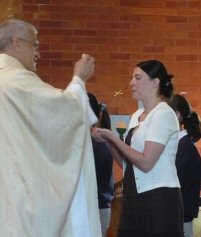
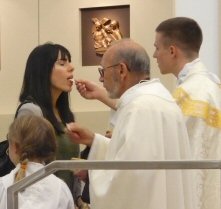
Priest/Deacon/
Extraordinary Eucharistic Minister:
The Blood of Christ.
The Faithful: Amen.
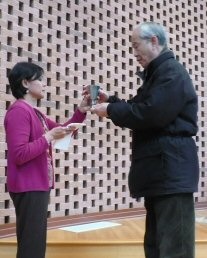
Cleansing of the Vessels:
Priest: Lord, may I receive these gifts in purity of heart. May they bring me healing and strength, now and for ever.
Prayer after Communion:
Priest: Let us pray.
Priest: Grant, O Lord, we ray, that we may delight for all eternity
in that share in your divine life, which is foreshadowed in the present age by
our reception of your precious Body and Blood. Who live and reign for ever
and ever.
Procession with the Blessed Sacrament:
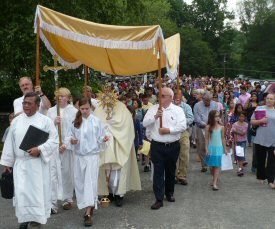
www.Divinemasterplanforlife.com
www.Saintsnheaven.com
Top
Home Page
Liturgical
Year Cycle A 13-14